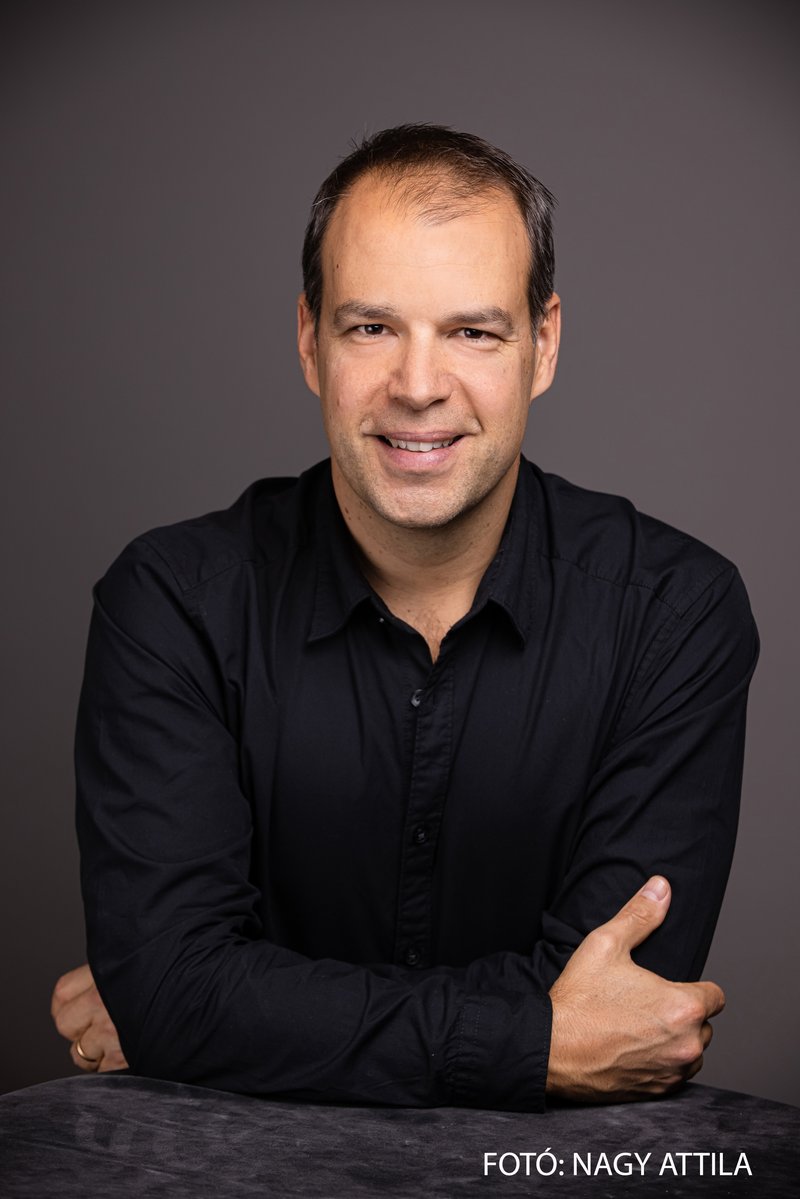Puccini in Love on Margaret Island: interview with Szabolcs Brickner
The life and works of Giacomo Puccini are inspired by women, whom he hunted and adored just as much as he searched for the stories for his operas – the composer confessed. Puccini was a man of great romantic temperament and a lover, he did not hesitate to seduce married women and even make them run away after impregnating them.
Puccini’s Madama Butterfly will be performed on June 26 and 28 at the Margaret Island Open Air Theatre. The internationally renowned soprano, Francesca Sassu, will sing Cio-Cio San. The performance will be directed by Teodóra Bán, the director of the institution, and Szabolcs Brickner will play the role of Pinkerton.
Thus, the meeting begins with the two of them reminiscing, since in 2008, after the tenor had obtained the highest degree available in Germany in the master class of the Augsburg College of Music, he made his debut in Gounod's Romeo and Juliet on Margaret Island. Teodóra Bán smiles and recalls that in the special performance, where prose, dance and classical opera appeared on an equal footing, a radiantly talented newlywed couple sang the two main roles, Juliet being played by Szabolcs' wife, Júlia Hajnóczy. We spoke to Szabolcs Brickner:
– I returned to the Margaret Island Open Air Stage three years ago, when I also had a concert there with a great international star, Aida Grifullina, to which the spirit of the place contributed a lot – the tenor switched to an interview situation. – The Water Tower, the moon, the ancient trees around the stage, provide an unforgettable experience that cannot be described, it has to be experienced. To my delight, I was able to experience this miracle again in 2023 as Don José in Bizet's Carmen.
– You earned your first degree from the Music Academy as a clarinetist. Why did you turn your back on the instrument and switch to a singing career?
– I feel that I can express myself better in singing. A clarinetist gives a concert, but in 99 percent of the cases, he sits in the orchestra as a tutti, and the singer, unless he is a choir member, is a soloist 100 percent. This fits my habitus better.

– You studied abroad for ten to twelve years and sang with several important companies from Vienna to Weimar. What differences do you find between operatic performances in the German-speaking area and domestic ones?
– In addition to performances abroad, I was also on stage in Budapest. When Szilveszter Ókovács invited me home with good role offers, I decided that I would no longer sit on two horses with one ass, because it had its downsides. As for the difference: I also sang many operettas in Vienna, in this case the difference is big due to the lightness of the genre. But on the opera stage everything is international, and we are not behind either. For example, Balázs Kovalik has had productions here for twenty years that would have made people abroad blink at the sight of them.
– Do you prefer classical staging, respect for tradition or modernity in opera performance?
– A famous conductor once told me that opera is not a museum, there should only be modern stagings. I have thought about this a lot, but I still lean a little towards the idea that opera is, in a certain sense, a museum. Because of the language and the context, you cannot take it out of its time; you cannot throw a Don Carlos or a Bánk bán into the 21st century and modernize it without looking askance. Furthermore, staging for its own sake distracts attention from us, the singers, and we do not like that, because the audience does not pay attention to what is visible in our performance, our facial expressions, what mood we convey with our voices, but to what the story is shaped into. But there are exceptions, fantastic modern stagings that carry a specific message.
– How do you relate to contemporary operas?
– These are usually written for a very specific voice. I have turned down all of the ones I have been asked to do so far, but not without first looking at the score. If I come across one where the music and the arrangement are for me, I will definitely take it on.
– Do you often say no to requests?
– If I include operettas, my repertoire is over thirty. I’m not saying that the range is too wide, but that I didn’t start with good repertoire. I sang a lot of lyrical and Mozart roles that weren’t for me. The general opinion is that you should start with a small role, but for a big voice this is as much of a trap as a bigger role for a smaller voice. In my case, the unpleasant thing was that I went all the way from Mozart to Donizetti. I’ve since abandoned Mozart, with the exception of Idomeneo in the Opera House program, because I have a father role there, which I have to perform in a real Italian tenor voice. I feel like I’ve been in the repertoire that suits me for five years. It’s an exaggeration to say that I would be selective, but when I’m asked, we always discuss it, and I usually say no. Fortunately, the current director doesn't think I'm timid or don't feel like performing, but he also thinks it's smart if I say what I can't do at a sufficient level. It's not allowed to sing, but it's forbidden to sing badly.
– How can you keep operas that are only performed periodically in your head, recall them from time to time, or even memorize works performed in the original language, sometimes in German, sometimes in Italian, sometimes in French?
– They remain the same as the ability to ride a bicycle, once you've learned them. Of course, you have to be patient at first, especially if you're learning in a language you don't speak at all. War and Peace in Russian was like that. It's like having to memorize a gibberish text. But we rehearse a new production for two months, we go through the entire opera several times a day, and during that time it becomes firmly fixed. For me, this memorization is something that is twentieth or hundredth of a degree. An outsider cannot even imagine how many much more difficult tasks fall upon us. For example, rehearsal starts at ten in the morning, but you wake up almost unable to speak. I can barely say goodbye to my poor wife and sons. Or I am in a bad mood. In such cases, the mental training provided by positive thoughts and a little stretching exercise before singing in usually help. It is also not the same from the point of view of the evening production, when and how much I eat, you can consume this and that. Everyone experiences what has a beneficial “medicine” for them.
– Are there better and less successful, indisposed performances?
– Of course, even the greatest ones are like that. Júlia Hamar once said that during her entire career she probably felt that she performed at one hundred percent ten times. Professionalism is about the fact that most of the time I am not at my best, but with the routine I rev myself up to eighty or ninety percent. You need to know when to use which vocal technique tool or trick.
– Do you have a soundproof room at home so that you and your wife, who is also a singer, don’t disturb each other while practicing?
– There is a non-soundproof singing room, with a piano and a mirror, I don’t need more than that. The children don’t even notice when I’m singing, because they’ve grown into it. They know that they’re not allowed to come in when I’m singing, but they sneak in anyway, and I distract them. My wife doesn’t sing anymore. After a while, there were no invitations back home. She could have gone abroad, but then the family would have fallen apart. This doesn’t cause any problems between us, because we were always happy for each other’s success. In many places, it’s the case that one party takes care of the family, while the other earns money. For the sake of my work, I need so much care and attention from my family that if Juli were working, my situation would be much, much more difficult.
– Have you ever performed as Pinkerton in Madama Butterfly?
– I had six or eight performances of it at the Opera House two years ago. I really liked it. Not because Pinkerton is such a likeable individual, although I like singing villainous roles. We tenors always get the role of the prince and the hero and the lover, a little excursion into other characters is a real treat. I love Madama Butterfly because of its voice carrying, the legatos, the Italian singing style. Puccini is an inimitable genius! He has been in a prominent place in my repertoire for years. It’s almost embarrassing to say this in the 21st century, because he is everyone’s favorite. But let me say it for the thousandth time: Puccini is the best! He is inimitable, the emotion comes through in his music, in every single instrument of the orchestra. I think even Verdi could hide behind him.
Source and photo: Margaret Island Theatre









